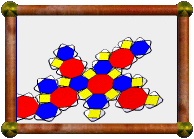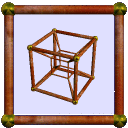


| Home > Research > Enumeration of Stellations | |
| Prev (Miller's 5th Rule) | Next (Augmented Uniform Polyhedra) |
Enumeration of Stellations |
This page contains results obtained using Great Stella. The question is: how many stellations are there of the Platonic solids, the Archimedean solids, and their duals? For some models the result remains unknown, because the time taken to calculate the result would be too long. For these models the number of stellations is always over one trillion (a very long way over).
Two criteria are of interest here. Fully supported stellations and Miller's rules.
For fully supported stellations, the previously highest count obtained was for the pentagonal icositetrahedron, with 72621 stellations, discovered by Peter Messer. All results higher than that are previously unpublished. The highest result obtained so far using Stella is for the pentagonal hexecontahedron, with over 30 trillion fully supported stellations. It took several months to compute on an Intel i5 2.5 GHz computer, counting over a million stellations counted per second.
For Miller's rules, the previously highest count was obtained was for the rhombic triacontahedron. It was enumerated by John Gingrich and mentioned only in a paper by Peter Messer (reference [17] in my paper). John designed a ciruit board specifically for the job. The result was calculated correctly, but a misunderstanding over Miller's 5th rule meant the final figure given was not quite right. I have been in contact with John Gingrich and we both agree that the figure of 358833098 calculated by Stella in the table below is the correct one. The largest result achieved with Stella so far is for the truncated dodecahedron with 2645087084526 stellations using Miller's rules. Compare this result with the number of fully supported stellations for the same model, a mere 1141, and you can see the huge difference between these criteria!
Notes:
- "*" lines represent duals of the model in the preceding line.
- Total numbers are followed in brackets by the number of reflexible, and then the number of chiral, for both cell types and stellations.
- My results include the core as a cell type and as a stellation.
- All stellations are included, even when they do not make use of all the facial planes of the original polyhedron. For example, the cube would be included as a stellation of the cuboctahedron. This is something I should probably fix sometime. For isohedral models, it makes no difference though, and these are generally the ones of most interest.
- The "Max Cells per Layer" column shows the maximum number of cell types which occur in any single layer. Here a pair of chiral cells is counted as two.
- Question marks show where I haven't been able to get an answer yet, and probably never will using the current algorithm.
- The "pseudo" models are ones where the vertices are only "locally" uniform, but a "cap" is twisted. They turn out to have prism symmetry.
| Platonic and Archimedean Solids | |||||
|---|---|---|---|---|---|
| Vertex Desc | #Layers | #Cell types (reflexible, chiral) | Max Cells per Layer | #Stellations - Fully supported (reflexible, chiral) | #Stellations - Miller's rules (reflexible, chiral) |
| 3.3.3 | 1 | 1 (1, 0) | 1 | 1 (1, 0) | 1 (1, 0) |
| 4.4.4 | 1 | 1 (1, 0) | 1 | 1 (1, 0) | 1 (1, 0) |
| 3.3.3.3 | 2 | 2 (2, 0) | 1 | 2 (2, 0) | 2 (2, 0) |
| 5.5.5 | 4 | 4 (4, 0) | 1 | 4 (4, 0) | 4 (4, 0) |
| 3.3.3.3.3 | 8 | 11 (10, 1) | 3 | 18 (16, 2) | 59 (32, 27) |
| 6.6.3 | 3 | 4 (4, 0) | 2 | 6 (6, 0) | 10 (10, 0) |
| * | 6 | 9 (7, 2) | 3 | 21 (17, 4) | 188 (52, 136) |
| 4.3.4.3 | 5 | 8 (8, 0) | 2 | 13 (13, 0) | 21 (21, 0) |
| * | 4 | 4 (4, 0) | 1 | 4 (4, 0) | 5 (5, 0) |
| 4.6.6 | 5 | 9 (9, 0) | 2 | 18 (18, 0) | 45 (45, 0) |
| * | 10 | 31 (18, 13) | 8 | 1762 (372, 1390) | 143383367876 (3642866, 143379725010) |
| 8.8.3 | 5 | 9 (9, 0) | 2 | 18 (18, 0) | 45 (45, 0) |
| * | 10 | 32 (19, 13) | 9 | 3083 (565, 2518) | 218044256331 (3645883, 218040610448) |
| 4.4.3.4 | 11 | 48 (31, 17) | 10 | 18827 (3339, 15488) | ? (128723453647, ?) |
| * | 10 | 32 (19, 13) | 7 | 1201 (386, 815) | 253811894971 (4060051, 253807834920) |
| Pseudo 4.4.3.4 | 13 | 132 (44, 88) | 31 | 28613467776022 (193594720, 28613274181302) | ? (?, ?) |
| Pseudo * | 12 | 88 (26, 62) | 23 | 5713528508 (1764087, 5711764421) | ? (?, ?) |
| 8.4.6 | 11 | 49 (32, 17) | 11 | 22632 (3254, 19378) | ? (317650001638, ?) |
| * | 23 | 292 (74, 218) | 38 | ? (14728897413, ?) | ? (?, ?) |
| 4.3.3.3.3 | 20 | 274 (0, 274) | 26 | 299050957776 (18, 299050957758) | ? (?, ?) |
| * | 12 | 69 (0, 69) | 10 | 72621 (0, 72621) | ? (0, ?) |
| 5.3.5.3 | 14 | 41 (32, 9) | 7 | 847 (432, 415) | 70841855109 (7071672, 70834783437) |
| * | 13 | 29 (20, 9) | 5 | 227 (115, 112) | 358833098 (84959, 358748139) |
| 5.6.6 | 14 | 45 (35, 10) | 7 | 1117 (579, 538) | 3082649548558 (162782259, 3082486766299) |
| * | 29 | 253 (93, 160) | 26 | 71112946668 (20687415, 71092259253) | ? (?, ?) |
| 10.10.3 | 14 | 45 (35, 10) | 7 | 1141 (600, 541) | 2645087084526 (128761995, 2644958322531) |
| * | 29 | 241 (89, 152) | 24 | 13902332663 (8809989, 13893522674) | ? (?, ?) |
| 5.4.3.4 | 29 | 273 (124, 149) | 27 | 298832037395 (133925171, 298698112224) | ? (?, ?) |
| * | 29 | 226 (83, 143) | 23 | 7146284014 (6446491, 7139837523) | ? (?, ?) |
| 10.4.6 | 29 | 294 (130, 164) | 29 | 1016992138164 (226575482, 1016765562682) | ? (?, ?) |
| * | 59 | 2033 (342, 1691) | 108 | ? (>10^12, ?) | ? (?, ?) |
| 5.3.3.3.3 | 47 | 1940 (0, 1940) | 68 | ? (579, ?) | ? (?, ?) |
| * | 32 | 536 (0, 536) | 29 | 30049378413796 (0, 30049378413796) | ? (0, ?) |
| Prisms and Antiprisms | |||||
| Vertex Desc | #Layers | #Cell types (reflexible, chiral) | Max Cells per Layer | #Stellations - Fully supported (reflexible, chiral) | #Stellations - Miller's rules (reflexible, chiral) |
| 3.4.4 | 1 | 1 (1, 0) | 1 | 1 (1, 0) | 1 (1, 0) |
| * | 2 | 2 (2, 0) | 1 | 2 (2, 0) | 2 (2, 0) |
| 5 or 6.4.4 | 2 | 2 (2, 0) | 1 | 2 (2, 0) | 3 (3, 0) |
| * | 4 | 6 (5, 1) | 3 | 11 (9, 2) | 25 (16, 9) |
| 7 or 8.4.4 | 3 | 3 (3, 0) | 1 | 3 (3, 0) | 6 (6, 0) |
| * | 6 | 12 (9, 3) | 5 | 53 (34, 19) | 884 (135, 749) |
| 9 or 10.4.4 | 4 | 4 (4, 0) | 1 | 4 (4, 0) | 10 (10, 0) |
| * | 8 | 20 (14, 6) | 7 | 260 (125, 135) | 299225 (2131, 297094) |
| 11 or 12.4.4 | 5 | 5 (5, 0) | 1 | 5 (5, 0) | 15 (15, 0) |
| * | 10 | 30 (20, 10) | 9 | 1324 (461, 863) | 956478162 (81336, 956396826) |
| 4.3.3.3 | 4 | 7 (5, 2) | 3 | 20 (12, 8) | 78 (36, 42) |
| * | 3 | 4 (3, 1) | 3 | 7 (5, 2) | 10 (7, 3) |
| 5.3.3.3 | 5 | 9 (7, 2) | 4 | 30 (20, 10) | 218 (79, 139) |
| * | 3 | 4 (3, 1) | 3 | 7 (5, 2) | 10 (7, 3) |
| 6.3.3.3 | 6 | 15 (10, 5) | 5 | 161 (71, 90) | 21695 (1004, 20691) |
| * | 5 | 9 (6, 3) | 5 | 36 (19, 17) | 123 (50, 73) |
| 7.3.3.3 | 7 | 17 (12, 5) | 6 | 216 (105, 111) | 64746 (1969, 62777) |
| * | 5 | 9 (6, 3) | 5 | 36 (19, 17) | 123 (50, 73) |
| 8.3.3.3 | 8 | 25 (16, 9) | 7 | 1079 (356, 723) | 59430630 (67797, 59362833) |
| * | 7 | 16 (10, 6) | 7 | 179 (69, 110) | 9822 (542, 9280) |
| 9.3.3.3 | 9 | 27 (18, 9) | 8 | 1359 (488, 871) | 180914190 (128818, 180785372) |
| * | 7 | 16 (10, 6) | 7 | 179 (69, 110) | 9822 (542, 9280) |
| 10.3.3.3 | 10 | 37 (23, 14) | 9 | 6626 (1587, 5039) | 1381889260340 (13187809, 1381876072531) |
| * | 9 | 25 (15, 10) | 9 | 916 (251, 665) | 10730395 (12907, 10717488) |
| 11.3.3.3 | 11 | 39 (25, 14) | 10 | 8055 (2081, 5974) | ? (24916982, ?) |
| * | 9 | 25 (15, 10) | 9 | 916 (251, 665) | 10730395 (12907, 10717488) |
| 12.3.3.3 | 12 | 51 (31, 20) | 11 | 39714 (6683, 33031) | ? (7662769412, ?) |
| * | 11 | 36 (21, 15) | 11 | 4836 (923, 3913) | 86516934850 (793961, 86516140889) |
| Home > Research > Enumeration of Stellations | |
| Prev (Miller's 5th Rule) | Next (Augmented Uniform Polyhedra) |